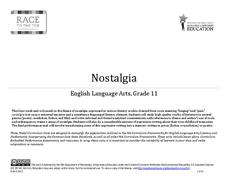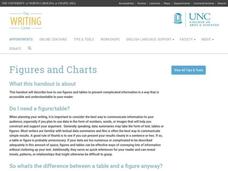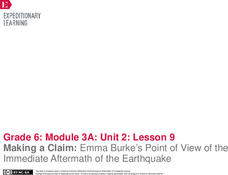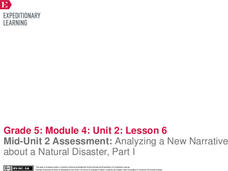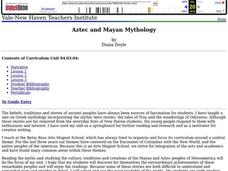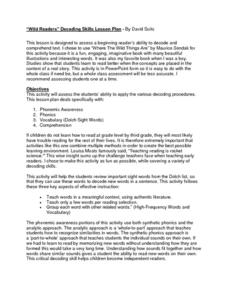ReadWriteThink
Analyzing Famous Speeches as Arguments
A speaker, a message, an audience. After analyzing these elements in Queen Elizabeth's speech to the troops at Tilbury, groups analyze how other speakers use an awareness of events, and their audience to craft their arguments....
Massachusetts Department of Education
Nostalgia
To prepare for crafting their own memoir, class members examine poetry by Margaret Atwood, Billy Collins, Robert Hayden, and Claude McKay, stories by Richard Rodriquez and Willa Cather, and Barry Levinson's film Avalon. They examine how...
University of North Carolina
Figures and Charts
Sometimes words aren't the best way to get information across to the reader. The eighth handout in the 24-part Writing the Paper series describes different type of figures and charts to display complex information in a paper....
CHPCS
The United States in the 1920s: The New Negro Movement and the Harlem Renaissance
Music, writing, and activism all tell the story of history! The resource uses these elements and more in a presentation to discuss the Jazz Age and Harlem Renaissance. Your class views biographies, discusses important events, and...
NET Foundation for Television
1850-1874 Beef Moves to Nebraska
Just how long was the Long Drive? Learners investigate the movement of cattle in the Great Plains during the mid-1800s. They incorporate photographic, newspaper, video, and primary source evidence into their posters, artwork, and written...
Lafayette Parrish School System
Teaching Tone and Mood
Tone and Mood are not synonymous! Introduce young readers to these literary devices with a series of exercises that not only point out the significant differences between the terms but also shows them how to identify both the tone and...
K20 LEARN
Diversity Quilt: A Lesson on Culture
After brainstorming the various aspects of cultural identity, class members interview each other, examine video clips, and read stories to discover how these aspects reveal one's cultural identity. Individuals then craft a quilt square...
Women in World History Curriculum
Women and Confucianism
Young historians consider the far-reaching effects of traditional teachings on the debates about the current attitudes toward women in society. The discussion begins with a list of New-Confucian sayings and expands to a global perspective.
Echoes & Reflections
Contemporary Antisemitism
Despite the recognized atrocities of the Holocaust, anti-semitism continues. The 11th and final installment of the Teaching the Holocaust series explores the long-term effects of the Holocaust on modern anti-semitism, asking pupils to...
Echoes & Reflections
Perpetrators, Collaborators, and Bystanders
After the Holocaust, the world grappled with how to bring justice to the Nazis. But what to do with the thousands—if not millions—who allowed it to happen? Young historians consider the issues of guilt, collaboration, and responsibility...
Library of Congress
The Harlem Renaissance
The Harlem Renaissance brought forth many American art forms including jazz, and the writings of Zora Neale Hurston and Langston Hughes. Using a carefully curated set of documents from the Library of Congress, pupils see the cultural...
EngageNY
Making a Claim: Emma Burke’s Point of View of the Immediate Aftermath of the Earthquake
Sharpen those pencils; it's time to write! Scholars begin writing the first body paragraph of their literary analysis essays. Additionally, pupils use graphic organizers to analyze a character's point of view from Laurence Yep's...
EngageNY
Making a Claim: Moon Shadow’s Point of View of the Immediate Aftermath
Body paragraphs are the building blocks of every essay. Pupils view and discuss a model essay using a rubric to evaluate one of its supporting paragraphs. Next, scholars use what they've learned to continue drafting their own literary...
EngageNY
Mid-Unit 2 Assessment: Analyzing a New Narrative about a Natural Disaster, Part I
Scholars complete a mid-unit assessment by analyzing a narrative text, In the Middle of the Storm. Learners determine the gist of the text, identify synonyms, make inferences, and answer text-dependent questions to demonstrate...
EngageNY
Mid-Unit Assessment: Analyzing a New Narrative about a Natural Disaster, Part II
See it through my eyes. Scholars complete mid-unit assessment part II by writing an essay describing how the narrator's point of view influences how the story is told in the text In the Middle of the Storm. Pupils also complete a...
NY Learns
Culture Clash: Exploring Characters within El Bronx Remembered by ECSDM
Using a character map, learners assign traits to characters from Nicholasa Mohr’s El Bronx Remembered: A Novella and Stories. In addition, groups record evidence from the stories to justify the labels and use these sheets to prepare for...
Curated OER
Aztec and Mayan Mythology
Here's a fresh take on a mythology unit. Use the myths of the Mayan and Aztec peoples of Mesoamerica instead of the more traditional Greek and Roman stories. This abstract suggests possible approaches and resources that can be used to...
World of Teaching
Black History Month 2008
A list of prominent African-Americans and their accomplishments makes up this presentation on Black History Month. Leaders in sports, the arts, science, and entertaining will help viewers connect with the voluminous contributions of the...
Curated OER
Synecdoche vs. Metonymy: Definitions
Ask your class to lend their ears, and eyes, to a short video that defines and offers examples of synecdoche and metonymy. Whether it be brand names like Kleenex® and Band-aids® that have come to stand for all the products in a category,...
Curated OER
Cliches, Paradoxes
Clichés, paradoxes, and equivocations are detailed in a short, animated video that defines and illustrates these writing traps. The resource also includes a quiz and the transcript for the video. Users can register to access free course...
Learning to Give
Humphrey The Lost Whale
The children's book Humphrey the Lost Whale tells an amazing tale of a community joining together for a common cause. Read this book with your class, making connections between the events in the story and personal experiences of young...
David Suits
“Wild Readers” Decoding Skills Lesson Plan
Set young readers on the path toward fluency with this phonemic awareness resource. Based on the award-winning children's book, Where the Wild Things Are, this lesson allows beginning readers to practice isolating phonemes and...
Curated OER
The Raven
After a close reading of Edgar Allan Poe's "The Raven" individuals copy the rhythm and rhyme scheme and rewrite the final stanzas of the poem.
Curated OER
Fairy Tales
Class groups examine fairy tales from a feminist and a Marxist perspective, identifying how these tales present gender roles and class/power systems. The groups then script and perform their own tale that uses one of these lenses.
Other popular searches
- Childrens Literature
- Response to Literature
- Children Literature
- Children's Literature
- Spanish Literature
- English Literature
- British Literature
- Literature Circle
- American Literature
- Symbolism in Literature
- Russian Literature
- Literature Response



